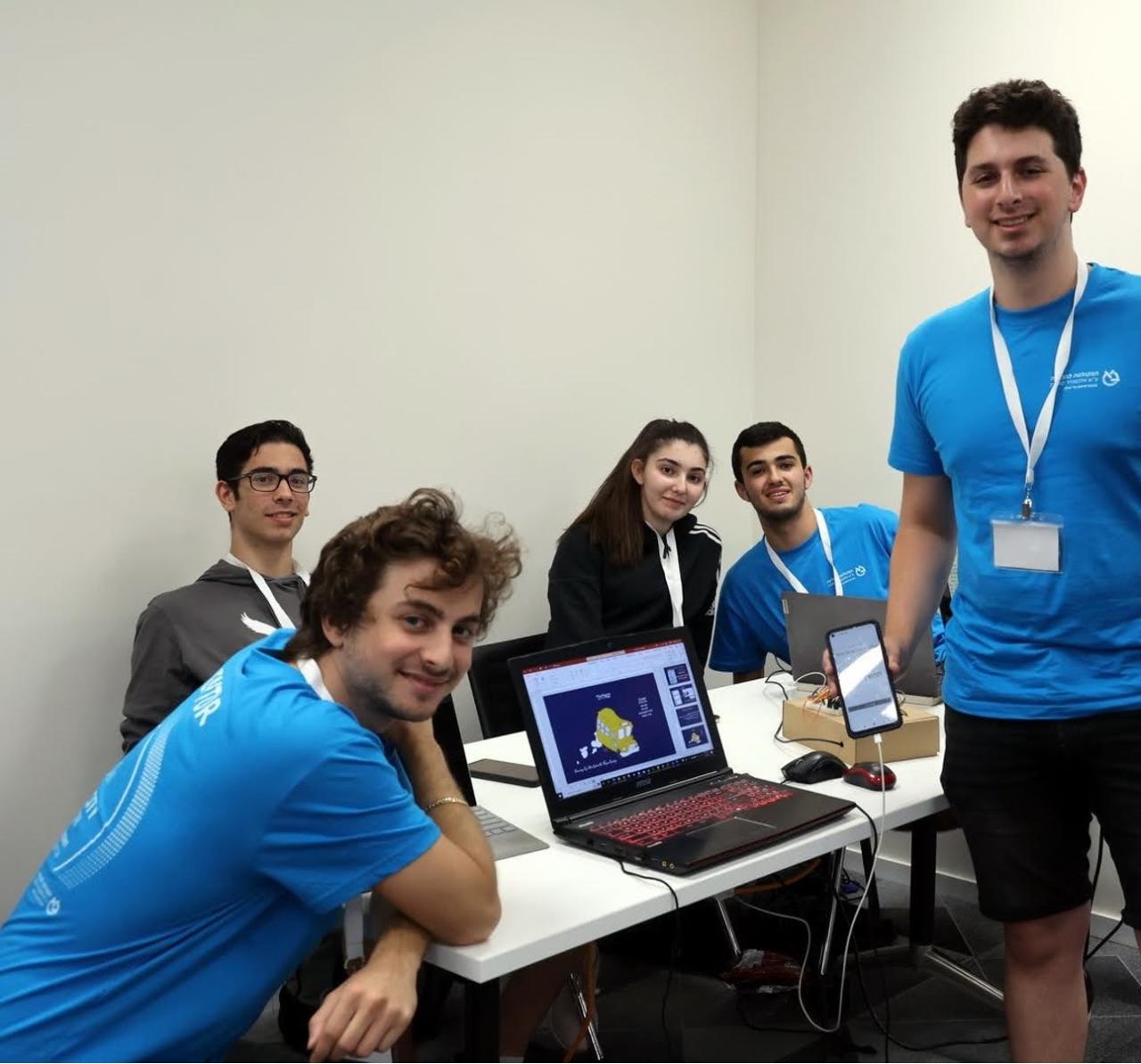Second Place: Helping public transportation commuters

Itai, Noam, Elai, Tamir, and Elin came up with a communication system for public transportation which will reduce instances of busses skipping stops, and can pave the way to autonomous public transportation
Second place winners of the Faculty of Engineering’s 2022 hackathon are all third-year students: Elai Fishman Forman and Tamir Shimoni from the signal processing and optics track, Itai Merlin from the nano-optics electrical engineering track, Noam Sheffer from the nano and signal processing electrical engineering track, and Elin Golan, a computer engineering student in the data processing and computer networks track. “We all met at Bar Ilan, we started studying for our BSc while still in high school, in a program for mathematically gifted teens. We are all 18-19 years old, and we postponed our military service so we can graduate,” shares Itai Merlin.
The group signed up for the hackathon as soon as registration opened, and they were highly motivated: “We knew we were here to win, and we were going to put our all into this,” explains Merlin. “We went through a bunch of ideas, and most of them fell through because of feasibility issues. We wanted to bring something that we could execute well during the hackathon. Eventually, we settled on our idea a few days before the event and worked on it throughout. I want to give credit to Noam Sheffer, without whom we never could have gotten this project as far as we did, at that level. Our project is essentially made up of three segments: server, user, and physical component. Noam was in charge of the physical component and the server, and the entire team tips its hat to him.”
The group wanted to solve a problem that is all too familiar to public transportation users in Israel: busses that skip stops, whether because the driver overlooked the waiting passenger, or because the bus is full. “Our solution is a system that notifies the driver of a passenger waiting at the stop. It includes a physical button located at the stop, in addition to an app that lets passengers notify the driver from their phone. The driver is notified so they can stop, or, in case the bus is full, notify the system,” explains Merlin. “It opens up a lot of opportunities for dynamic public transportation planning; for instance, if the system recognizes that there is a passenger waiting but the bus cannot stop for them, it can send out another backup bus, or launch a bus route from a specific point. Having a system that aggregates this data – how many people are waiting, where and for what line – will help public transportation operate much more reliably, with better daily planning and better backup mechanisms for unforeseen problems.”
The system also offers a feature that alerts the driver about passengers with special needs: handicapped passengers requiring assistance, or passengers with luggage that needs to be stowed away in the luggage compartment. Additionally, says Merlin, “this system opens a doorway to autonomous public transportation, because the bus no longer has to stop at each stop, but rather only where passengers are waiting. Plus, it’s very cheap and easy to apply.”
The group won second place at the hackathon and is now looking to continually develop their idea. “We received an offer to do a pilot at the university, and in the future, we plan on bringing our solution to municipalities and making it a real, actionable solution. In addition to the immediate and comprehensive solution to the problem of skipping busses, the system can – for minimal investment – provide valuable data that could significantly improve public transportation in Israel and the world.”
 Elai Fishman Forman and Tamir Shimoni from the signal processing and optics track, Itai Merlin from the nano-optics electrical engineering track, Noam Sheffer from the nano and signal processing electrical engineering track, and Elin Golan, a computer engineering student in the data processing and computer networks track.
Elai Fishman Forman and Tamir Shimoni from the signal processing and optics track, Itai Merlin from the nano-optics electrical engineering track, Noam Sheffer from the nano and signal processing electrical engineering track, and Elin Golan, a computer engineering student in the data processing and computer networks track.
Last Updated Date : 20/06/2022



